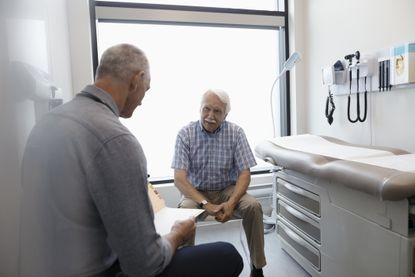Prostate cancer: the symptoms to look out for in your partner
It's the most common men's cancer...

Prostate cancer is now the most common cancer in men in the UK, with nearly 50,000 cases being diagnosed in the UK each year.
Currently, one in eight men will get prostate cancer in their lifetime, with the disease killing one man every hour, according to Prostate Cancer UK.
Music legend Rod Stewart, 74, spoke out about his own diagnosis last year - revealing he had been secretly battling prostate cancer for the last two years, and is now thankfully 'in the clear'.

Sharing his story at a prostate charity event, he explained that catching it early helped his recovery.
He told the crowd,"No one knows this, but I thought this was about time I told everybody. I'm in the clear, now, simply because I caught it early. I have so many tests."
Before urging his fellow men to get themselves checked, saying, "Guys, you've got to really go to the doctor."
It's true - if caught early, prostate cancer is usually treated successfully. And this type of cancer is particularly prevalent in the over 50s, so knowing the symptoms could prove life-saving.
Sign up for the woman&home newsletter
Sign up to our free daily email for the latest royal and entertainment news, interesting opinion, expert advice on styling and beauty trends, and no-nonsense guides to the health and wellness questions you want answered.
Read on to find out more about the symptoms of prostate cancer and how to spot it, in yourself or your partner
What is prostate cancer?
Only men have a prostate, which is a small and squishy gland about the size of a walnut that sits between the bladder and the rectum. It also surrounds the uretha, which is the tube men urinate and ejaculate through.
The size of the prostate gets bigger with age, which is why the risk of this type of cancer increases with age. Although not an essential part of the anatomy, it is a necessity for reproduction and fertility. Cancer in this area develops when cells in the prostate start to grow in an uncontrolled way.
Prostate cancer symptoms
Not everyone experiences symptoms, which is why it is important to get routine check ups with your doctor. There are a variety of detection tests, including a rectal examination, a prostate biopsy, or the prostate specific antigen (PSA) test, a blood test that has advantages and disadvantages - read more about it here.
Your doctor may get you to have the tests even if you present no symptoms, if they deem you to be at particularly high risk.Men who are at higher risk of the cancer include those over 50, people who are black, and those whose father or brother has already had the disease.
For those who do have symptoms, they will usually experience changes in urinary or sexual function, due to the prostate's proximity to other organs. These symptoms include:
- The need to urinate more than usual, in particular at night
- Difficulty either starting urination or holding it back
- Weak or interrupted flow of urine
- Pain or burning sensation during urination
- Dribbling after finishing urinating
- A feeling that the bladder isn't empty after urination
- Difficulty in having an erection
- Painful ejaculations
- Blood in the urine or semen
- Frequent pain or stiffness in either the lower back, hips or upper thighs.
It is important that if your partner or a loved one is experiencing any of these symptoms that they are checked out by a doctor as soon as possible.
Who is at risk of prostate cancer?
It is most common for people to be diagnosed between the ages of 65 and 69, however the chances of getting it significantly increase after the age of 50.
MORE:Study reveals this type of meat could actually reduce risk of breast cancer
It can be a hereditary condition so if a family member has had it in the past then it is important to get regular check ups.
Although no one knows how to prevent prostate cancer, staying healthy can help. Research has shown that being overweight or obese increases your risk of contracting cancer, and can make it more aggressive.
Prostate cancer treatment
There are a wide range of different treatments for the disease and a doctor will advise on the best cause of action. Treatments include, chemotherapy, radiotherapy, a prostatectomy (surgery to remove the prostate), hormone therapy and cryotherapy (which involves freezing and thawing the cancer).
Doctors also use 'active surveillance' and 'watchful waiting' when treating prostate cancer - monitoring a cancer before treating it straight away, to avoid some of the negative effects of treatment if possible.
For more information on prostate cancer head to Prostate Cancer UK or Cancer Research UK where you can also find details about other types of cancer.
If you are worried about a partner or loved one then always seek advice from a doctor.
Charlotte Tonry was Social Media Editor at womanandhome.com, taking care of the brand's Instagram, Twitter, Facebook and Pinterest channels, before moving to Marks & Spencer to become their Social Media Manager for clothing and homes.
-
 I tried the Spotlight Oral Care Sonic toothbrush - here's why I'll recommend the budget-friendly buy to friends in 2024
I tried the Spotlight Oral Care Sonic toothbrush - here's why I'll recommend the budget-friendly buy to friends in 2024The Spotlight Oral Care Sonic toothbrush offers more for your money than some of the big brands, with 30 to 50,000 brush strokes a minute
By Caramel Quin Published
-
 These are 32 of the best foods to eat before a workout, whatever your gym goals
These are 32 of the best foods to eat before a workout, whatever your gym goalsPower yourself through exercise with the best foods to eat before a workout
By Lauren Clark Published